In the international real estate markets, Turkey has always been recognized as one of the attractive destinations for investors and homebuyers. However, experience shows that many buyers focus only on the price announced by the seller or real estate websites and overlook ancillary costs that can increase the final budget by 5% to 25%. In 2026, Turkey's tax and administrative laws have undergone fundamental changes, making awareness of them vital for every general buyer to prevent financial surprises and potential fraud. This report provides a detailed examination of cost items, from government taxes to bank fees and post-purchase maintenance costs, to provide a transparent picture of the "True Cost of Ownership" in Turkey.
Initial Costs of Buying a House in Turkey: Beyond the Property's Declared Price
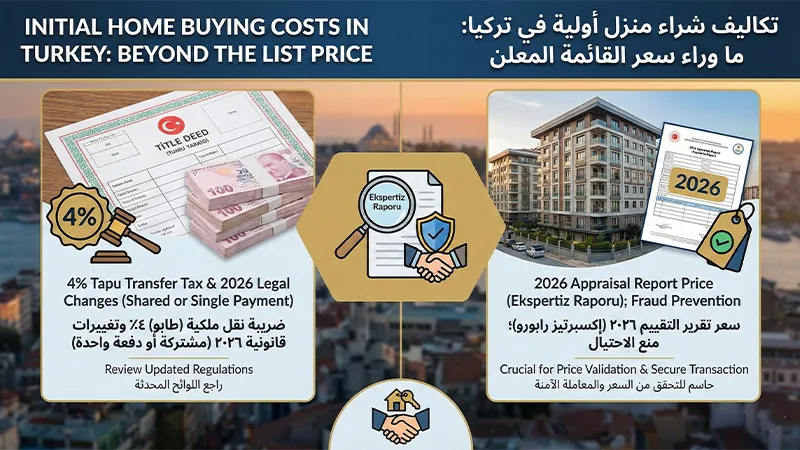
When a buyer decides to trade a property in Turkey, their first encounter with side costs occurs during the Title Deed (Tapu) transfer stage. Contrary to popular belief, the price agreed upon with the seller is not the final amount paid. In 2026, packaged "Closing Costs" for most second-hand properties range between 4% and 7% of the purchase price. This percentage includes government taxes, registration fees, and initial expert costs.
The 4% Title Deed (Tapu) Transfer Tax and 2026 Legal Changes
The Title Deed transfer tax (Tapu Harcı) is the largest government cost item, set at 4% of the property value. According to official Turkish laws, this amount should be paid equally (2% by the buyer and 2% by the seller). However, in Turkish market custom and in most sales contracts to foreign nationals, the payment of the entire 4% is placed on the buyer.
A strategic point in 2026 is the change in how this tax is calculated. The Turkish government, by implementing the "200% Cap" law on tax values (Emlak Vergi Değeri), has increased the property tax base in high-demand areas like Istanbul and Antalya by up to three times. This means that even if the tax rate remains at 4%, the final amount paid has jumped significantly due to the growth of the calculation base. Also, with the operationalization of the "Property Value Information Center" (Değer Bilgi Merkezi), government systems now automatically match the prices declared in the deed with bank transactions and received loans to prevent tax evasion.
Expertise Report Prices in Turkey 2026; Preventing Real Estate Fraud
Obtaining an Appraisal Report (Expertise) is a legal requirement before the transfer of the title deed for all foreign nationals intending to buy property in Turkey. This report is prepared by independent experts licensed by the Capital Markets Board of Turkey (SPK), and its goal is to determine the true market value of the property.
In 2026, the tariffs for this report have been updated based on the type of property and its area according to the table below:
| Property Type and Usage | Minimum Cost (TRY) | Maximum Cost (TRY) |
|---|---|---|
| Residential Units (up to 1000 m²) | 26,000 | 37,733 |
| Commercial, Offices, and Warehouses | 28,283 | 92,158 |
| Agricultural and Orchard Lands | 27,683 | 45,052 |
| Barren Lands and Licensed for Construction | 35,421 | 92,017 |
This report is not just an administrative cost, but a form of insurance for the buyer to ensure they do not purchase the property for more than its real value. In 2026, the importance of this report has doubled; because if the value determined in the appraisal report is even slightly lower than the threshold of $400,000 (for citizenship) or $200,000 (for residency), the applicant's legal requests will fail.
Special Tariffs for Foreigners for Document Registration in Turkey
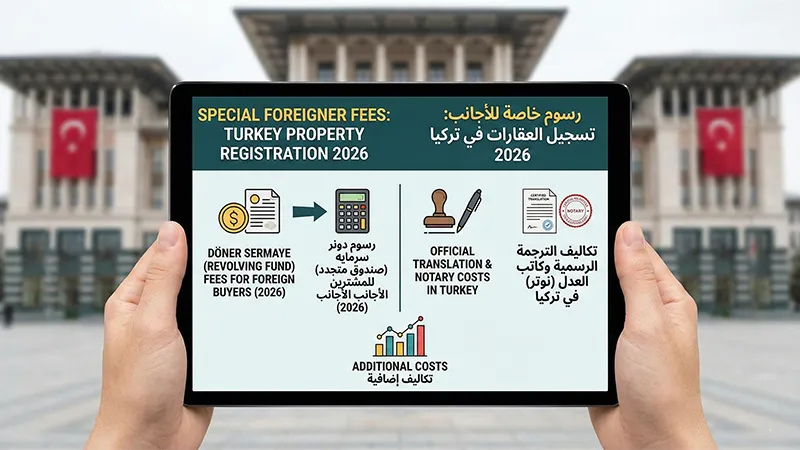
One major difference in ancillary costs for the year 2026 is the emergence of a "Foreigner Tariff" in the administrative services sector. The Turkish government has considered different administrative costs for non-citizens to manage international transactions.
Circulating Capital (Döner Sermaye) Fee for Foreign Buyers 2026
In addition to the 4% tax, an amount under the title of "Circulating Capital" is collected at the Land Registry and Cadastre Office. While Turkish citizens pay about 6,680 TRY for this part, foreign nationals in 2026 face much higher amounts. If both parties (buyer and seller) are foreigners, this cost can increase up to 48,400 TRY. For buyers who purchase several low-priced units to reach the citizenship threshold, these fixed fees can become a heavy budget item.
Official Translation Expenses and Notary Fees in Turkey
Since all legal documents in Turkey are drafted in Turkish, the presence of an official translator at key stages is mandatory. These costs include:
-
Official Court Sworn Translator: Presence at the Tapu office or Notary for oral translation of documents. The cost of this service in 2026 varies between 2,000 and 10,000 TRY depending on the time spent and the city.
-
Passport Translation and Certification: The passports of the buyer and companions whose names appear on the deed must be translated by an official translator and certified at the notary (Noter). The translation cost for each passport is about 600 TRY, and the notary certification fee for each high-density document page is about 1,770 to 3,540 TRY.
-
Power of Attorney (POA): Many buyers give a power of attorney to their lawyer or representative due to physical absence. The cost of drafting a POA at the notary for foreign nationals in 2026 is estimated between 3,000 and 5,300 TRY.
Real Estate Commission in Turkey 2026 and Lawyer Fees
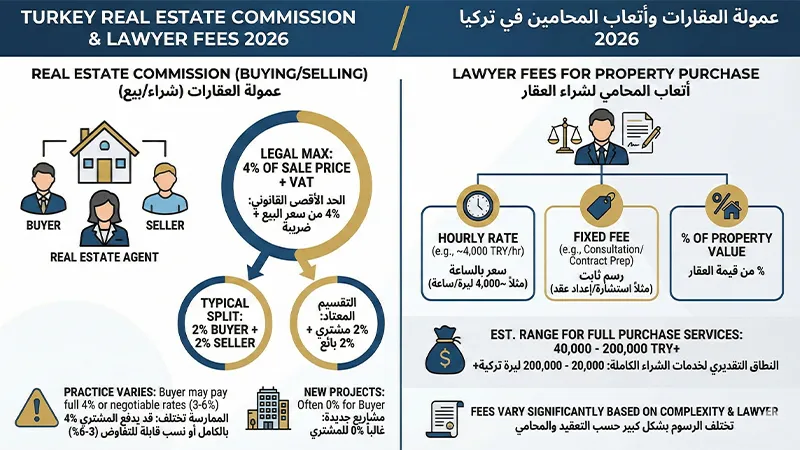
In the Turkish real estate market, the role of consultants and lawyers goes beyond simple mediation, and their fees constitute a significant portion of the side costs.
What is the Legal Real Estate Commission Percentage in Turkey 2026?
According to Turkish legal regulations, the standard real estate agent fee is 2% from the buyer and 2% from the seller (plus VAT on services). In 2026, given the increase in the VAT rate on services in Turkey, buyers should consider a total of about 2.4% of the property price as commission.
Many new-build projects and large developers pay the consultant's commission themselves to make the property more attractive to the buyer; therefore, in direct purchases from projects, this 2% is often removed from the buyer's shoulders. However, buyers should be wary of hidden amounts that some unauthorized brokers receive through informal agreements with owners, exceeding the legal cap.
Cost of Hiring a Lawyer for Property Purchase in Turkey
Although hiring a lawyer is not mandatory for buying property in Turkey, it is highly recommended for foreign nationals who are not familiar with the complexities of the "Real Estate Law." Legal costs for performing title searches, checking for debts or liens on the property, and drafting secure contracts usually vary between 15,000 and 60,000 TRY (depending on property value and scope of service) in 2026.
Obtaining the Foreign Exchange Purchase Certificate (DAB) and Money Transfer Costs
One of the most important and sometimes surprising parts of the cost of buying property in Turkey for foreigners is the currency conversion process. Based on Turkish Central Bank circulars, all foreign buyers are required to obtain a "Foreign Exchange Purchase Certificate" (Döviz Alım Belgesi - DAB).
In 2026, this process is as follows:
- The buyer must transfer the currency (Dollar or Euro) from abroad to their account in Turkey.
- The commercial bank is obliged to sell this currency to the Central Bank of Turkey and receive its Lira equivalent.
- Currency conversion fees and the difference between buying and selling rates at banks can consume between 0.5% and 1.5% of the total amount.
Using informal methods such as exchange offices or cryptocurrencies (USDT) for direct payment to the seller in 2026 will result in the failure to issue the DAB certificate and, consequently, the inability to transfer the deed or rejection of the citizenship application.
Value Added Tax (KDV) on Property in Turkey and Exemption Conditions
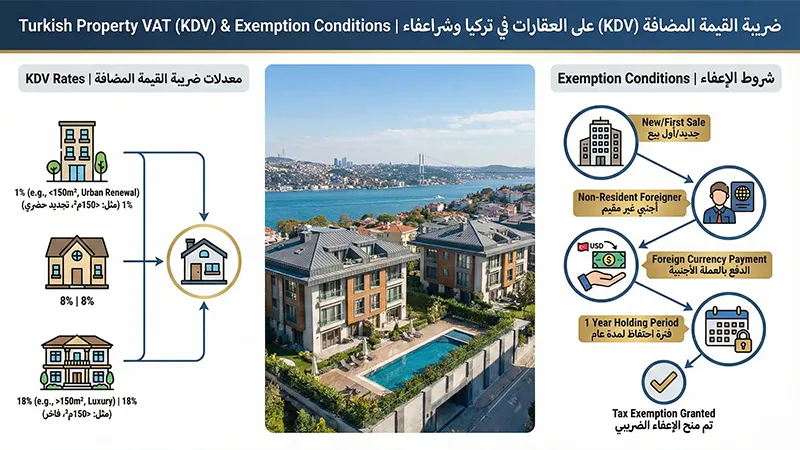
Value Added Tax (VAT/KDV) is one of the largest variables in buying new properties. This tax is not applied to second-hand properties traded between natural persons. However, in purchases from construction companies, the following rates prevail in 2026:
- 1%: For residential units with small area or in urban renewal zones.
- 10%: Average rate for most standard new-build residential units.
- 20%: For commercial properties (offices and shops) and luxury units in specific categories.
Step-by-Step Guide to Receiving KDV Tax Exemption
Foreign buyers who are not residents of Turkey can be exempted from paying this tax (up to 20% savings), provided that:
- They bring the purchase funds in currency from abroad and provide official bank evidence.
- They do not sell the purchased property for at least one year (according to general laws) or three years (if using specific benefits).
| Property Type | KDV Rate (2026) | Exemption Potential |
|---|---|---|
| New-build Apartment (Standard) | 10% | Yes (100% Exemption) |
| Office / Commercial | 20% | Yes (100% Exemption) |
| Second-hand Property (Private) | 0% | Not required |
Post-Purchase Expenses in Turkey: From Maintenance Fees to Utilities
Many buyers imagine that costs end with receiving the deed. However, for settling in and maintaining the property, the following cost items are important in 2026.
Mandatory Earthquake Insurance (DASK) Price in 2026
DASK insurance is mandatory for all properties that have a Title Deed (Tapu) across Turkey. Without this insurance policy, it is impossible to get water, electricity, and gas subscriptions. The DASK cost is calculated annually based on area and earthquake risk zone, and in 2026, it is estimated at about 160 Euros for a typical two-bedroom apartment.
Water, Electricity, and Gas Subscription Costs in Turkey 2026
The process of transferring or receiving new subscriptions for water and electricity meters in Istanbul and other large cities involves deposit and installation costs. In 2026, the total of these costs for a residential unit is on average as follows:
| Subscription Type | Deposit Amount (TRY) | Admin & Installation Fee (TRY) |
|---|---|---|
| Electricity (Security Deposit) | 1,890 | 75 - 1,048 |
| Water (Deposit & Infrastructure) | 1,573 | 3,802 |
| Natural Gas (Estimated) | 2,500 | 500 |
| Estimated Total | ~6,000 | ~5,400 |
Monthly Complex Maintenance Fee (Aidat) and Annual Municipal Tax
1. Monthly Maintenance Fee (Aidat): In modern Turkish residential complexes, maintenance costs (pool, security, cleaning) are the responsibility of the owners. In 2026, due to increased energy costs and wages, these amounts range between 2,000 and 7,000 TRY per month for standard apartments. 2. Annual Property Tax: This tax is equivalent to 0.1% (for small towns) to 0.2% (for metropolises) of the property value, paid in two installments. Due to the revision of official values in 2026, this amount has grown by up to 300% compared to previous years.
Hidden Risks and Heavy Tax Penalties in Turkey's New Laws
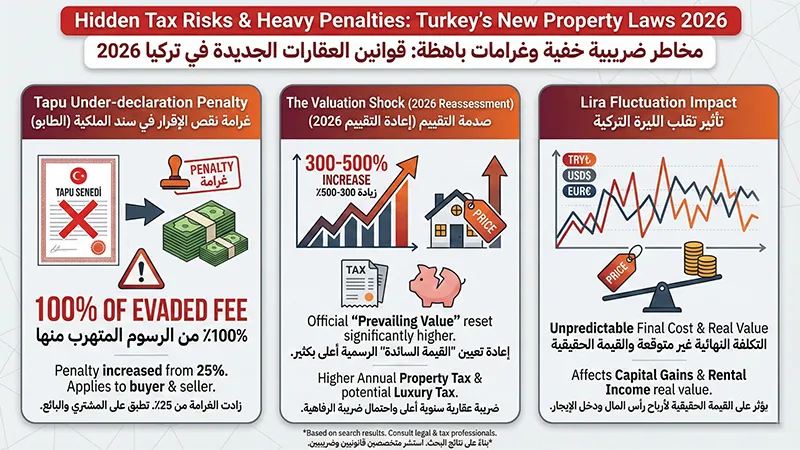
In 2026, the Turkish government, utilizing digital systems, has significantly increased oversight on real estate transactions. Awareness of these risks can save the buyer from heavy losses.
Penalty for Under-declaring Property Price in the Deed (Tapu) 2026
In the past, many buyers and sellers registered the property price in the deed much lower than reality to evade tax. In 2026, the penalty for this action has increased from 25% to 100% of the evaded tax. The "Value Information Center" system, by monitoring similar prices in the area, opens a tax case as soon as it detects a significant discrepancy and demands the difference in tax plus a 100% fine from the parties.
New Digital 3D Model Cost for Property Registration
From the beginning of 2026, registering deeds for many new projects, as well as the transfer of some old properties, requires the submission of a "3D Digital Compliance" model. This cost, estimated between $500 and $1,000, is a new expense that buyers of second-hand properties should consider in their negotiations.
Impact of Lira Price Volatility on Final Property Costs
Since property prices for foreign nationals are often declared in Dollars or Euros but taxes are paid in Lira, exchange rate fluctuations between the contract and the deed transfer can change side costs. It is suggested that buyers always consider a 2% margin of safety for currency fluctuations in their budget.
Final Budgeting Checklist for Buying Property in Turkey
| Cost Item | Rate / Amount (2026) | Key Note |
|---|---|---|
| Deed Transfer Tax | 4% of declared value | Usually borne by the buyer |
| Expertise Cost | 26 - 38 thousand TRY | Mandatory for foreigners |
| Notary & Translation | 5 - 15 thousand TRY | Depends on pages and companions |
| Utilities Deposit | ~12 thousand TRY | For electricity, water, and gas |
| DASK Insurance | 120 - 310 Euros | Annual and mandatory |
Buying property in Turkey in 2026, despite investment attractions, requires a mechanical and precise approach to costs. For a stress-free buying experience, the following tips are recommended:
- The 5-7% Rule: For second-hand properties, always set aside 5% to 7% of the purchase price for side costs.
- The 10-15% Rule: For new-build properties (due to potential KDV inclusion and initial connection costs), consider your ancillary budget up to 15% of the property price.
- Checking Previous Debts: Ensure that monthly maintenance (Aidat) and previous annual taxes have been settled by the seller, as in Turkey these debts transfer to the property.
- Use the Official Banking System: Never pay funds in cash or through informal exchange offices; in 2026, only documented bank transactions result in the issuance of a DAB certificate and the legal security of your deed.
Ultimately, awareness of these costs not only prevents financial surprises but also increases the buyer's bargaining power against sellers and real estate agents. The Turkish market in 2026 is a market for informed and precise buyers who manage their capital intelligently by knowing the new tax laws.

 USD
USD
 TRY
TRY
 EUR
EUR
 IRR
IRR
 RUB
RUB
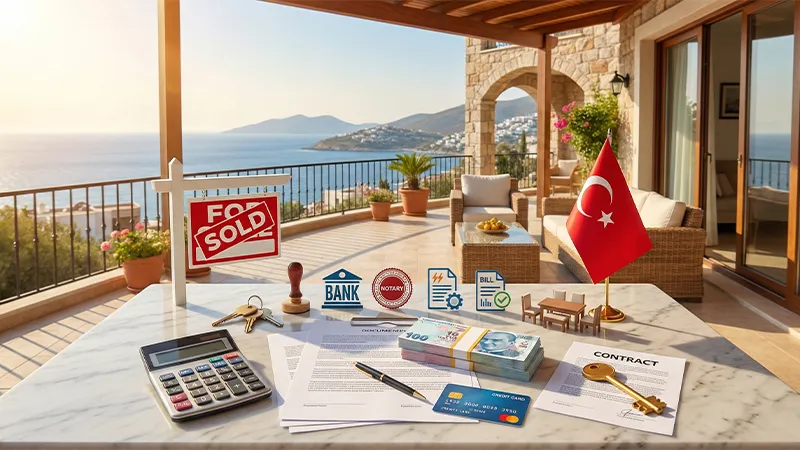
Comments